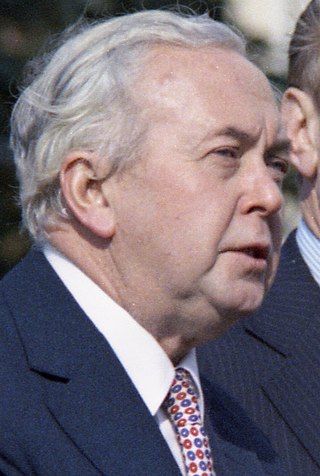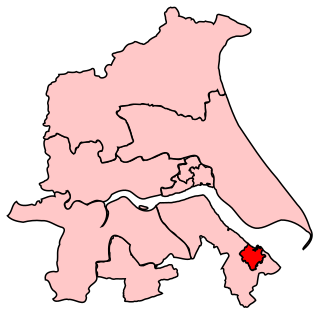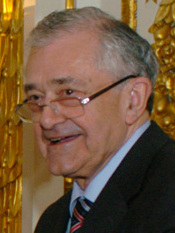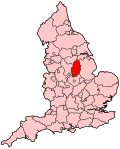
The 1983 United Kingdom general election was held on Thursday 9 June 1983. It gave the Conservative Party under the leadership of Margaret Thatcher the most decisive election victory since that of the Labour Party in 1945, with a majority of 144 seats and the first of two consecutive landslide victories.

The October 1974 United Kingdom general election took place on Thursday 10 October 1974 to elect 635 members of the House of Commons. It was the second general election held that year; the first year that two general elections were held in the same year since 1910; and the first time that two general elections were held less than a year apart from each other since the 1923 and 1924 elections, which took place 10 months apart.

Charles Anthony Raven Crosland was a British Labour Party politician and author. A social democrat on the right wing of the Labour Party, he was a prominent socialist intellectual. His influential book The Future of Socialism (1956) argued against many Marxist notions and the traditional Labour Party doctrine that expanding public ownership was essential to make socialism work, arguing instead for prioritising the end of poverty and improving public services. He offered positive alternatives to both the right wing and left wing of the Labour Party.

The 1966 United Kingdom general election was held on Thursday 31 March 1966. The result was a landslide victory for the Labour Party led by incumbent Prime Minister Harold Wilson.

A by-election was held for the United Kingdom Parliament seat of Birmingham Hodge Hill, on 15 July 2004. The by-election was called following the resignation of Labour Party Member of Parliament (MP), Terry Davis, on 22 June 2004. Davis had been appointed as Secretary General of the Council of Europe. The by-election was held on the same day as the Leicester South by-election, which saw Labour lose the seat to the Liberal Democrats on a 21% swing.

Ashfield is a constituency represented in the House of Commons of the UK Parliament. It is in the English county of Nottinghamshire, East Midlands, to the north west of the city of Nottingham in the Erewash Valley along the border with neighbouring county Derbyshire.

Great Grimsby was a constituency in North East Lincolnshire represented in the House of Commons of the Parliament of the United Kingdom since December 2019 by Lia Nici of the Conservative Party. Between 1918 and 1983 it was known simply as Grimsby; following the 2023 Periodic Review of Westminster constituencies, the seat will be subject to boundary changes which will incorporate the neighbouring town of Cleethorpes. As a consequence, it will be renamed Great Grimsby and Cleethorpes, to be first contested at the 2024 general election.

The 2005 United Kingdom general election was held on Thursday 5 May 2005, to elect 646 members to the House of Commons. The governing Labour Party led by the prime minister Tony Blair won its third consecutive victory, with Blair becoming the second Labour leader after Harold Wilson to form three majority governments. However, its majority fell to 66 seats; the majority it won four years earlier had been of 167 seats.

The 2010 United Kingdom general election was held on Thursday 6 May 2010, to elect Members of Parliament to the House of Commons. The election took place in 650 constituencies across the United Kingdom under the first-past-the-post system. The election resulted in a large swing to the opposition Conservative Party led by David Cameron similar to that seen in 1979, the last time a Conservative opposition had ousted a Labour government. The governing Labour Party led by the prime minister Gordon Brown lost the 66-seat majority it had previously enjoyed, but no party achieved the 326 seats needed for a majority. The Conservatives won the most votes and seats, but still fell 20 seats short. This resulted in a hung parliament where no party was able to command a majority in the House of Commons. This was only the second general election since the Second World War to return a hung parliament, the first being the February 1974 election. This election marked the start of Conservative government for the next 14 years.
David Ian MarquandFLSW was a British academic and Labour Party Member of Parliament (MP).
Timothy John Smith is a British former Conservative politician.
Parliamentary by-elections in the United Kingdom occur when a Member of Parliament (MP) vacates a House of Commons seat during the course of a parliament.

The 1982 Beaconsfield by-election was a parliamentary by-election held on 27 May 1982 for the House of Commons constituency of Beaconsfield in Buckinghamshire.

The 1977 Birmingham Stechford by-election, in Birmingham, on 31 March 1977 was held after Labour Member of Parliament (MP) Roy Jenkins resigned his seat following his appointment as President of the European Commission. A seat that had been solidly Labour since its formation in 1950, it was won by Andrew MacKay of the Conservative Party, before being regained by Labour in 1979. The by-election was noted for the strong performance of the National Front candidate and the presence of two far left candidates.

A Glasgow Hillhead by-election was held on 25 March 1982. The by-election was caused by the death of the Conservative Party Member of Parliament for Glasgow Hillhead Tam Galbraith on 2 January 1982.
The 1977 by-election for the Great Grimsby took place on 28 April 1977.
In the run up to the general election of 2005, several polling organisations carried out opinion polling in regards to voting intention in Great Britain. Results of such polls are displayed below.
The constituency of Enfield Southgate returned a memorable result in the 1997 United Kingdom general election, when the seat's incumbent Member of Parliament, the Conservatives' Michael Portillo, lost to Labour's Stephen Twigg.

The 2015 North East Lincolnshire Council election took place on 7 May 2015 to elect members of North East Lincolnshire Council in England. This was on the same day as other local elections and the general election for the House of Commons of the United Kingdom.

The 2017 United Kingdom general election in England was held on Thursday 8 June 2017 across 533 constituencies within England.















